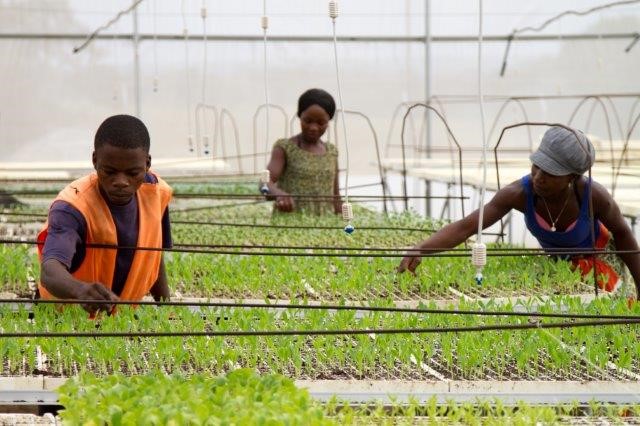In five provinces of Angola, between 2011 and 2016, Green Innovations’ investee Agricultiva brought modern farming to rural areas mainly dedicated to subsistence agriculture. Intended to increase the availability and access to quality and nutritional valued food produce to populations, five farms, with a total cultivated area of 3000 Hc, were designed and developed to become leading agro-farming and livestock production centres, integrating facilities of food production(such as agriculture fields, greenhouses, henhouses and stockyards) food processing (like feed mills, slaughterhouses) packing, marketing and distribution.
The innovative technologies introduced in these farms allowed intensive market-driven scale production that supplied, not only the local markets, but also wholesale and retail chains at national level, namely in the capital – Luanda. Annual production levelsreached 850 tons of vegetables, 2000 tons of cereals, 8000 tons of animal feed, 825 tons of meat, 14 million poultry and more than 53 million eggs, improving the balance of national production in the volume of foodstuffs available for consumers.
However, it was not just the quality, the production levels or the technology that made Agricultiva farms well known in their regions – it was their inclusive agro-business model. Interacting with local producers, the farms bought, packed and sold an annual average of 400 tons of produce from 180 local farmers, who would otherwise face bigger constraints in selling their produce in the markets at a fair price, adding value to it in the supply chain. Moreover, the farms produce provided income to hundreds of market sellers, especially women, who bought vegetables, chicken and eggs at the farms and sold them in the local informal markets.
For the local peasants, who went on cultivating in the farms perimeter, and the ones from neighbouring villages, the farms provided 780 jobs, guidance and training. Over 1800 local peasants were engaged in 26 training sessions, mainly focused on sowing and planting techniques, irrigation, types of soils and fertilization methods. Over 90% of a surveyed group referred having made changes in their production practices after training, namely in crop rotation, intercropping, preparation of the soil, more efficient sowing and fertilization.
At the institutional level, Agricultiva farms’ working model granted them recognition and appreciation from another stakeholder: the Agriculture State authorities. By engaging the local technicians of the municipal agrarian development stations (responsible for rural extension direct work with the peasants in the fields) in the training sessions, the transferred knowledge could be assimilated by these agrarian experts and replicated to a higher number of peasants in each province.
For the agrarian technician graduates of the local professional schools, placed in those development stations, working in Agricultiva farms gave them the chance to deal with mechanized farming means they did not have at their institutes, practising their knowledge in modern agriculture and livestock techniques. They would then pass the acquired knowledge to other producers in their region – farmers and smallholders – who would follow the farms’ examples and improve the quality of the local produce at a general level. The farms' business model was designed for private operation. Agricultiva ensured operation and maintenance of the farms for a contracted period, after which the farms were delivered to the State authorities. When it happened, in 2016, the production levels decreased. Some months later, the farms returned to private hands.
As lessons learnt, for future projects, Agricultiva will take into account the transfer of knowhow and empowerment of future managers, whether they be public, private or cooperative entities, so the quality patterns and production levels keep on increasing sustainably and the farms remain as models of modern and inclusive production in their region.
